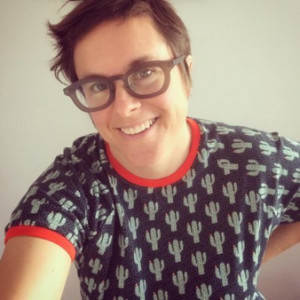This post is part of our new Countdown to Conference (C2C) series. We would love to feature a brief blog post from you too! Visit our main Countdown to Conference page for details!
C2C: Exploring gender in the early years
by Lizzie Maughan, Flinders University
 Thank you to the Gender and Education Association for giving me a bursary to attend the conference this year in Newcastle. My research is social justice oriented and I am interested in practical applications, so having the opportunity to meet practitioners along with academics is fantastic. The conference theme this year strongly relates to my research; debates about knowledge, authority, truth and power are all central to my PhD project. I am investigating young children’s response to and engagement with gender in the early years (ages 4-8) through a focus on queer and post-structural gender pedagogies.
Thank you to the Gender and Education Association for giving me a bursary to attend the conference this year in Newcastle. My research is social justice oriented and I am interested in practical applications, so having the opportunity to meet practitioners along with academics is fantastic. The conference theme this year strongly relates to my research; debates about knowledge, authority, truth and power are all central to my PhD project. I am investigating young children’s response to and engagement with gender in the early years (ages 4-8) through a focus on queer and post-structural gender pedagogies.
I aim to challenge and disrupt dominant assumptions about the adult/child and teacher/student binaries, bringing issues of power and authority to the fore. Specifically, drawing on the new sociology of childhood, I am challenging assumptions that children lack competency and agency. This conception of children then has the potential to destabilise power relations between adults and children. Furthermore, my research blurs the borders between researcher and participants, challenging ideas of truth and knowledge. Namely that there is no singular truth, and knowledge is something we construct rather than uncover, and within the research context this may be co-constructed between researcher and participants, even young children.
Drawing on the new sociology of childhood, I am challenging assumptions that children lack competency and agency. This conception of children then has the potential to destabilise power relations between adults and children.
My project is a three-phase ethnographic study in an early years classroom. The first stage, developed in collaboration with the classroom teacher, is a series of lessons or activities overtly about gender. A variety of stimuli from images, toy catalogues, videos, books and songs will be used, and children will be invited to engage through conversation, theatre, artwork and writing. Ideas such as stereotypes, non-binary gender, transgender, ally, gendered language, and gender policing will be explored. This first stage will be a co-construction of gender knowledge and look to how children embrace or resist queer and post-structural conceptions of gender.
The second stage involves observations and interactions during fantasy play such as in home corner (eg. Play kitchens) or small world (eg. Trains, cars, blocks) areas. The focus at this stage is to see how children embrace or resist the new theoretical space offered in stage one during their independent play.
The final stage is a collaborative analysis with the children and a review of the project with children, the teacher, and parents. This stage will explore the benefits and challenges of engaging children with post-structural and queer perspectives of gender as perceived by children, teachers and parents. The aim is that this might give practical guidance to teachers or parents wanting to help their children address gender issues.
GEA Conference will be my first international conference since I started my PhD at Flinders University and I’m very excited. If you see me around, please say hi!
If you are attending conference, let us know on Twitter using the hashtag: #GEAconf2018


